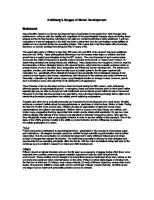Greenhalgh's Stages of Negotiation [PDF]
Greenhalgh’s Ideal Stages of Negotiation Stage 1. Preparation Key Tasks Defining interests, priorities, goals & BATNA;
40 0 46KB
Papiere empfehlen
![Greenhalgh's Stages of Negotiation [PDF]](https://vdoc.tips/img/200x200/greenhalghx27s-stages-of-negotiation.jpg)
- Author / Uploaded
- Henry
Datei wird geladen, bitte warten...
Zitiervorschau
Greenhalgh’s Ideal Stages of Negotiation
Stage 1. Preparation
Key Tasks Defining interests, priorities, goals & BATNA; process planning; assessing the other party; assessing the situation; planning proposals & defense; selecting & preparing negotiating team; managing constituents & third parties; planning your approach.
2. Relationship Building
Establishing rapport; getting to know the other party(s) needs/wants & perspective; understanding how the parties differ; building commitment towards a mutually beneficial outcome; discussing protocol & process matters; diffuse any fear or hostility.
3. Information Gathering
Learning about the details of the issues; learning more about the other party(s) needs/wants & perspectives; exploring the feasibility of possible agreements; exploring the consequences of no agreement; identifying areas of agreement (i.e., “common ground”) & disagreement; discussing relevant standards of fairness, evidence, precedent, etc.
4. Information Using
Making the case for your preferred agreement; pre-opening offers; agreeing on joint decision criteria, generating options for possible agreement; re/framing using appropriate persuasion techniques.
5. Bargaining
Making opening offers, counters & concessions; establishing and narrowing the zone of potential agreement; closing; reaching agreement or pursuing BATNA
6. Closing
Building commitment to the agreement reached in the previous stage; parties re/assuring themselves that they have reached a deal they can be happy with (or at least accept).
7. Implementing
Executing the agreement; determining who needs to do what once the agreement is reached; handling flaws, omissions & changing circumstances
Greenhalgh (2001) argues that this is the way people ought to negotiate; it is not a description of how most negotiations actually occur. He also notes that deviations from this process can frequently be predicted by culture norms or customs, individual differences and various contextual factors. Although it implies some problematic assumptions, it is nevertheless a useful framework to think about negotiations and to plan and manage your negotiations. Remember, achieving a good negotiation outcome depends on (1) preparation, (2) an effective, well-managed negotiation process and (3) chance. The latter is random and beyond our control, but the first two can be learned and improved upon with effective training, practice and reflection.









